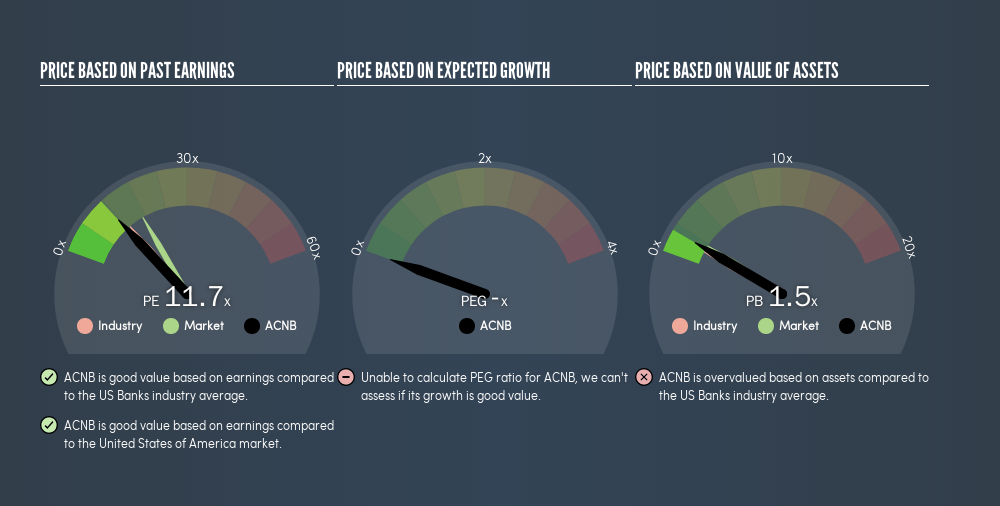- United States
- /
- Banks
- /
- NasdaqCM:ACNB
Does ACNB Corporation's (NASDAQ:ACNB) P/E Ratio Signal A Buying Opportunity?

This article is for investors who would like to improve their understanding of price to earnings ratios (P/E ratios). We'll look at ACNB Corporation's (NASDAQ:ACNB) P/E ratio and reflect on what it tells us about the company's share price. ACNB has a P/E ratio of 11.68, based on the last twelve months. In other words, at today's prices, investors are paying $11.68 for every $1 in prior year profit.
View our latest analysis for ACNB
How Do You Calculate A P/E Ratio?
The formula for P/E is:
Price to Earnings Ratio = Price per Share ÷ Earnings per Share (EPS)
Or for ACNB:
P/E of 11.68 = $36.1 ÷ $3.09 (Based on the year to December 2018.)
Is A High Price-to-Earnings Ratio Good?
A higher P/E ratio implies that investors pay a higher price for the earning power of the business. That isn't a good or a bad thing on its own, but a high P/E means that buyers have a higher opinion of the business's prospects, relative to stocks with a lower P/E.
How Growth Rates Impact P/E Ratios
Earnings growth rates have a big influence on P/E ratios. When earnings grow, the 'E' increases, over time. Therefore, even if you pay a high multiple of earnings now, that multiple will become lower in the future. A lower P/E should indicate the stock is cheap relative to others -- and that may attract buyers.
It's nice to see that ACNB grew EPS by a stonking 107% in the last year. And its annual EPS growth rate over 5 years is 7.9%. With that performance, I would expect it to have an above average P/E ratio.
How Does ACNB's P/E Ratio Compare To Its Peers?
The P/E ratio essentially measures market expectations of a company. If you look at the image below, you can see ACNB has a lower P/E than the average (12.8) in the banks industry classification.

Its relatively low P/E ratio indicates that ACNB shareholders think it will struggle to do as well as other companies in its industry classification. Since the market seems unimpressed with ACNB, it's quite possible it could surprise on the upside. If you consider the stock interesting, further research is recommended. For example, I often monitor director buying and selling.
Don't Forget: The P/E Does Not Account For Debt or Bank Deposits
The 'Price' in P/E reflects the market capitalization of the company. Thus, the metric does not reflect cash or debt held by the company. Hypothetically, a company could reduce its future P/E ratio by spending its cash (or taking on debt) to achieve higher earnings.
Such spending might be good or bad, overall, but the key point here is that you need to look at debt to understand the P/E ratio in context.
Is Debt Impacting ACNB's P/E?
ACNB has net debt worth 31% of its market capitalization. If you want to compare its P/E ratio to other companies, you should absolutely keep in mind it has significant borrowings.
The Verdict On ACNB's P/E Ratio
ACNB's P/E is 11.7 which is below average (17.3) in the US market. The EPS growth last year was strong, and debt levels are quite reasonable. If it continues to grow, then the current low P/E may prove to be unjustified.
Investors have an opportunity when market expectations about a stock are wrong. If it is underestimating a company, investors can make money by buying and holding the shares until the market corrects itself. Although we don't have analyst forecasts, shareholders might want to examine this detailed historical graph of earnings, revenue and cash flow.
But note: ACNB may not be the best stock to buy. So take a peek at this freelist of interesting companies with strong recent earnings growth (and a P/E ratio below 20).
We aim to bring you long-term focused research analysis driven by fundamental data. Note that our analysis may not factor in the latest price-sensitive company announcements or qualitative material.
If you spot an error that warrants correction, please contact the editor at editorial-team@simplywallst.com. This article by Simply Wall St is general in nature. It does not constitute a recommendation to buy or sell any stock, and does not take account of your objectives, or your financial situation. Simply Wall St has no position in the stocks mentioned. Thank you for reading.
About NasdaqCM:ACNB
ACNB
A financial holding company, offers banking, insurance, and financial services to individual, business, and government customers in the United States.
Flawless balance sheet with reasonable growth potential and pays a dividend.
Similar Companies
Market Insights
Community Narratives





